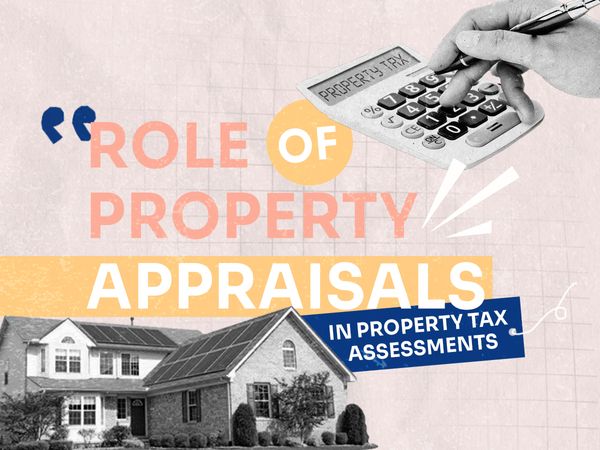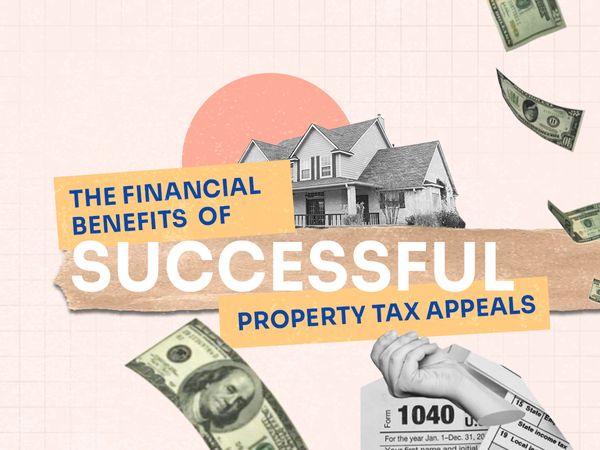So, you’ve purchased a home or are planning on purchasing one in the state of Texas. Great! However, there’s one key aspect you need to be aware of as an existing/upcoming Texan homeowner—the role of property appraisals in property tax assessments in the State of Texas. While you might already be aware of the term property tax, you might not know everything about property appraisals or how they directly impact your property taxes. Read on to learn more!
What is Property Tax Assessment?
The State of Texas does not levy any direct taxes on homeowners in its many different cities and neighborhoods. The taxes are instead levied by the local administration and/or service providers in the region. The below service providers are entitled to levy property taxes and conduct annual assessments:
1) Schools
2) Police Departments
3) Fire Departments
4) Street and road authorities
There are multiple constitutional provisions made for homeowners to ensure their properties are taxed uniformly and that there is no inequality or bias when it comes to property taxation. One of the key provisions designated by law is that all properties (except for constitutionally exempt properties) must be taxed uniformly in proportion to their value and no single property can be taxed more than its fair market value.
What is Property Tax Appraisal?
Property tax appraisal is the procedure used to arrive at the final tax value of your property. It is an annual appraisal process followed by local appraisal authorities. The final property tax value is arrived at after multiple factors are considered, including market value, location, and other details.
The property appraisal phase generally begins in January and lasts through mid-May in a calendar year. Below is the timeline that is followed:
1) January 01 to April 30: Property is appraised and exemption applications are processed
2) April 01 to May 01: Notices of properties appraised are sent
3) May 15: Appraisal record is prepared and submitted to the Appraisal Review Board (ARB)
After the above steps, there are other criteria that are followed throughout the rest of the year until the taxes are finally collected in the last calendar quarter, i.e., from October 01 to December 31 with an additional 1 month (January 31) provided for convenience.
As previously mentioned, there are certain properties that are exempt from property tax – they do not undergo the usual annual appraisal procedure or are partially exempt from paying property taxes. These are properties owned by those who are 65 or older (partial exemption), veterans (partial exemption), or a surviving spouse (partial exemption), among others. However, let’s first understand how the property tax value is determined.
How is the Property Tax Value Determined?
All properties follow a standard appraisal procedure by the local appraisal authorities, by which the tax for your property is determined. Each appraisal district determines the final value of your property based on its market value.
The market value of your property is the existing price of your property that it would be sold at if left on the market for an average amount of time – not sold off immediately nor languishing on the market for years. The market value is arrived at through either or all of these three approaches – the market approach, the income approach, or the cost approach.
The market approach helps the authorities arrive at the price for a home in a particular area based on the price of recently sold properties in that neighborhood, accounting for differences in property characteristics like the age, size, location, condition, etc.
The income approach, on the other hand, analyzes financial data like income and expenses, and by applying appropriate capitalization or discount rates, assesses the current value of a prospective income stream or the benefits associated with a property. This assessment helps in estimating the price at which a potential buyer might acquire the property.
The cost approach evaluates the cost required to replace the property or its parts based on its depreciation value. This helps in determining its current value.
Once the value of your property has been determined, the appraisal value is accordingly set.
How Often are Properties Appraised?
The mandate for appraisal districts states that the properties in the State of Texas be appraised at least once every three years. However, they may be appraised more frequently to ensure that the market value has not changed since the previous appraisal, and that the taxation levied continues to be just and fair.
When is a Property Sent an Appraisal Notice?
You will be notified of your property’s revised appraisal under these conditions:
1) The value is higher than the previous appraised value
2) The value is higher than the value rendered by the owner
3) The property was not on the appraisal list last year
4) If the exemption/partial exemption on your property has been recently canceled or reduced
If your appraisal value has changed, you are eligible to receive an appraisal notice by April 1 for homeowners and May 1 for other kinds of property owners—or as soon as practically feasible after that date.
What are the Contents of an Appraisal Notice?
If you receive an appraisal notice, the contents will include all the details of the property that were evaluated, namely your property, along with a description of the parameters on which it was evaluated. Additionally, it will present details of the units allowed to tax your property. The notice will include both the previous year’s appraisal value plus the taxable value, as well as this year’s appraisal value and taxable value. This will help you compare and understand the difference in the taxation and the difference in the new value as opposed to the old one.
Furthermore, the notice also mentions the right of homeowners to protest the new taxation amount or rates mentioned via the ARB. It provides a detailed explanation of how to protest, the ARB hearing information, and how to schedule an informal conference with the appraisal district prior to your formal ARB hearing.
The final thing the notice details is that the appraisal district is not responsible for nor does it finalize the tax increases. Their role is limited to determining the property’s value and arriving at the amount depending on existing taxation laws, as mandated by the authorities.
What is the Importance of Property Appraisal?
Property appraisals are a crucial aspect of the economy to ensure stability, smoothness, and equality among all homeowners and property owners. Timely and accurate property appraisals ensure the negative potential consequences of irregular taxation are avoided. It also ensures that all homeowners are treated fairly and their properties are aligned with the existing legal norms.
What if There Were No Property Appraisals?
As tempting as it may sound, having no property appraisals would result in the below consequences, which would be detrimental for property owners in the state.
Difficulty in estimating the right value of the property:
If there were no timely or scheduled appraisals, there would be no accurate way to determine the fair market value of properties. There might be some properties that are charged too high or low compared to the market rates. Also, not regularly reviewing exemptions would lead to certain properties taking advantage of the situation and enjoying a tax-free status, burdening other property owners even further. Regular and timely appraisals ensure the value of all properties is determined fairly, and that all taxes are levied based on the property’s actual value.
Litigation and property disputes:
If there were no proper appraisals, homeowners might refuse to accept the current valuation of their property and dispute the taxes levied. As there would be no comparisons, no timeliness, and no standard form of evaluating the similarities or differences between properties in a neighborhood, things would soon end up in uncharted chaos and dissatisfaction among property owners. It might cause homeowners to feel overtaxed, with no substantial way of proving their property’s exact value. It would lead to increasing legal disputes, further burdening the state’s administration.
Difficulty in securing loans for real estate:
Most lending agencies like banks or other authorized sources require a proof of property value acquired through regular property appraisals. This helps them arrive at a loan estimate, as well as treat the property as sufficient collateral against the loan. Property appraisals often help in securing better mortgage rates and set both parties’ minds at ease, with no possibility of a property being undervalued, and thus detrimental to either party. Not having timely property appraisals would make it more difficult for you, as a homeowner, to secure loans, negatively impacting real estate transactions in the region.
Insurance woes:
All the above instances directly impact the pricing of homes or other properties in the area, wherein they might be overvalued or undervalued. A lack of property appraisals can also result in a sudden real estate boom or decline with no adequate proof of valuation. Regularized valuation ensures that you are protected as a buyer and it helps maintain equilibrium in the real estate market.
Impact on real estate pricing:
Lack of property appraisals also results in a sudden real estate boom or decline owing to market prices being inflated or the real estate market crashing with no adequate proof of valuation. Regularized valuation ensures you are protected as a buyer and it helps maintain equilibrium in the real estate market.
Impact on local government revenue:
Property taxes are a major source of income for the Texas government. Any instability in the property market directly impacts taxes. With undervaluation and no proper means of determining the accurate amount of tax, it could lead to considerably less taxes collected, directly and negatively impacting multiple public services, including infrastructure, schools, law and order, public safety, etc.
Property taxes therefore help regulate the pricing of real estate and maintain a balance, making it easier for property owners and potential buyers to understand the pricing. It also provides a safety net where potential buyers can rest assured that the prices they pay for properties are fair, with no possibility of being duped or their money going to waste.
ARB and the Importance of Disputing Property Valuation
Even though property taxation is a crucial part of maintaining law and order, the right to dispute property taxes is just as important for homeowners. If, after your property valuation, at any point you feel dissatisfied, you have every right to protest the appraisal and file a protest seeking a reevaluation. Approaching an Appraisal Review Board (ARB) entitles you to your query being heard and resolved in a legal manner through proper channels.
Once you have filed your protest, you will be sent a formal notice regarding your ARB hearing with all the relevant details. Prior to the formal hearing, you can even request an informal conference with the ARB to resolve the matter without a formal, legal hearing. ARB guarantees property owners a medium to voice their complaints and resolve them in a timely fashion, with orderliness and proof.
The Final Takeaway
Property appraisals and property valuations are an important instrument in maintaining a healthy real estate market in the state, along with ensuring that all homeowners are provided equal rights and fair dealing when it comes to real estate matters and transactions in the present and future.
With Bezit's comprehensive services, Texas residents can enjoy a smoother and more transparent property tax assessment process. Bezit is on a mission to make homeownership a joyful and fulfilling experience for every Texan.
Our expert team lets Texans rest assured that they are paying the correct amount in property taxes, while asserting their right to property tax protest if needed. To find out more, visit Bezit.co.




